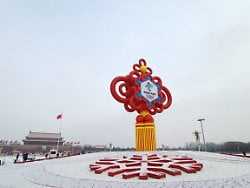Guest list for opening ceremony
“Rogue meeting” at the Olympic flame
01/28/2022, 06:38 p.m
The Beijing Winter Olympics mark another turning point in the history of the Games. In the third year of the pandemic, the world is twitching nervously. This is also reflected in the guest list for the opening ceremony. From a Western point of view, it is reminiscent of a “villain meeting” in a Bond film.
In view of the diplomatic boycott of leading nations in the western world, China’s President Xi Jinping wants to thank the few and mostly autocratic leaders who attended the opening ceremony of the Winter Olympics in Beijing (Friday, February 4) with a large train station. According to reports from Chinese state broadcaster CCTV, a celebratory banquet will be held with all the officials and dignitaries who have traveled after the Olympic flame lighting ceremony.
The guest list released by CCTV, with just over 20 representatives from Olympic participating countries, reflects the geopolitical situation of the Olympic hosts and in part evokes memories of the “axis of evil” once proclaimed by the United States. Saudi Arabia’s Crown Prince Mohamed Bin Salman and Egypt’s no less controversial President Abd al-Fattah as-Sisi had only recently confirmed their participation in the opening ceremony. The Emir of Qatar is also among Xi’s guests.
At least Putin is coming
Poland’s President Andrzej Duda and his Serbian colleague Aleksandar Vucic are also traveling from Europe to the Middle Kingdom. The aristocracy is represented by Monaco’s Prince Albert II, who is also a member of the International Olympic Committee (IOC), and Thailand’s Princess Sirindhorn. Xi’s most notable guest, however, is Russia’s President Vladimir Putin. Despite the ban on Russian representatives from participating in major sporting events because of the state doping scandal, the Kremlin chief can attend the ceremony thanks to Xi’s personal invitation. Significantly, last year Putin was also the first head of state to agree to attend the opening ceremony despite mounting criticism of China’s human rights record.
At the beginning of December, the USA announced a diplomatic boycott of the games as a sign of opposition to the Chinese human rights policy. Washington’s decision was followed shortly thereafter by the governments of Great Britain, Canada and Australia. The German federal government wants to wait for a common position within the European Union (EU) on the question of an official boycott of the games at diplomatic level, which, however, could no longer be concluded after Duda’s trip to Beijing. However, Berlin has already announced that no government officials are planning to travel to the Middle Kingdom during the games.
